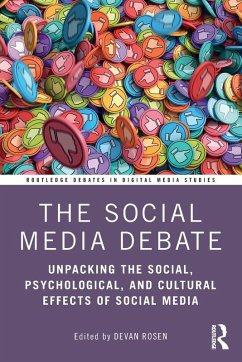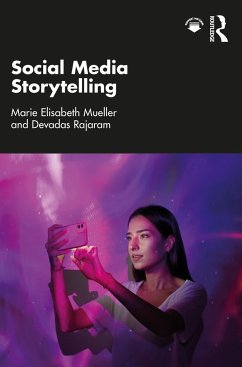
The Social Media Debate
Unpacking the Social, Psychological, and Cultural Effects of Social Media
Herausgegeben: Rosen, Devan
Versandkostenfrei!
Versandfertig in 6-10 Tagen
154,99 €
inkl. MwSt.
Weitere Ausgaben:

PAYBACK Punkte
77 °P sammeln!
This accessible, student-friendly book provides a concise overview of the primary debates surrounding the impact and effects of social media.From Facebook, Twitter, and Instagram to Snapchat and TikTok, social media has become part of our everyday experience. However, its proliferation has brought a myriad of serious concerns about the long-term effects of social media on socializing and personal relationships and the impact on well-being and mental health (particularly in relation to children and adolescents), as well as issues linked to information and culture (such as privacy, misinformatio...
This accessible, student-friendly book provides a concise overview of the primary debates surrounding the impact and effects of social media.
From Facebook, Twitter, and Instagram to Snapchat and TikTok, social media has become part of our everyday experience. However, its proliferation has brought a myriad of serious concerns about the long-term effects of social media on socializing and personal relationships and the impact on well-being and mental health (particularly in relation to children and adolescents), as well as issues linked to information and culture (such as privacy, misinformation, and manipulation). Featuring contributions by leading international scholars and established authorities such as Christian Fuchs, Henry Jenkins, Michael A. Stefanone, and Joan Donovan, editor Devan Rosen brings together key contemporary research from multiple disciplines in order to provide crucial insight into these debates.
This book will be an important resource for students and scholars of media and communication, as well as educators, parents, policy makers, and clinicians interested in the impacts of social media.
From Facebook, Twitter, and Instagram to Snapchat and TikTok, social media has become part of our everyday experience. However, its proliferation has brought a myriad of serious concerns about the long-term effects of social media on socializing and personal relationships and the impact on well-being and mental health (particularly in relation to children and adolescents), as well as issues linked to information and culture (such as privacy, misinformation, and manipulation). Featuring contributions by leading international scholars and established authorities such as Christian Fuchs, Henry Jenkins, Michael A. Stefanone, and Joan Donovan, editor Devan Rosen brings together key contemporary research from multiple disciplines in order to provide crucial insight into these debates.
This book will be an important resource for students and scholars of media and communication, as well as educators, parents, policy makers, and clinicians interested in the impacts of social media.














